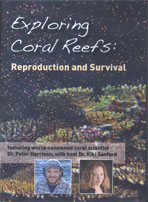
Exploring Coral Reefs: Reproduction and Survival 2011
Distributed by The Video Project, PO Box 411376, San Francisco, CA 94141-1376; 800-475-2638
Produced by Plankton Productions
Directed by David Donnenfield
DVD, color, 34 min.
Grade School - General Adult
Environmental Studies
Date Entered: 11/28/2011
Reviewed by Barbara Butler, University of Oregon Institute of Marine BiologyCoral reefs are one of the most beautiful and biologically diverse ecosystems on earth and because of our fascination with them there are a large number of appropriate educational resources from which to choose. The right pick for your collection will depend on your objectives and your primary audience. Exploring Coral Reefs is hosted by award-winning science educator Dr. Kiki Sanford. A series of interviews between “Dr. Kiki” and coral reef biologist Dr. Peter Harrison of Southern Cross University in Australia make up the five chapters of the video: The Work of a Coral Reef Scientist; Coral Reef Reproduction; Coral Reef Mass Spawning; Coral Repair Mechanisms; and Coral Survival. Viewers will gain a thorough background in coral reproduction and learn of conditions threatening coral reefs such as global warming and pollution. Grade school and junior-high audiences seem to be the target for this production, but the content is appropriate for high-school audiences as well. However, the interview format may be off-putting to this age group. This video would be an appropriate addition to a collection serving young audiences and is suitable for classroom use. The film invites students to help preserve coral reefs and to learn what it takes to be a biologist and researcher. The underwater film sequences are quite good and a lot of information is delivered in each six to eight-minute chapter. A more thorough resource, also available from Video Project, is the 60 minute Climate Change and Coral Reefs: Comprehensive Classroom Resource which is also hosted by Dr. Sanford. Recommended.